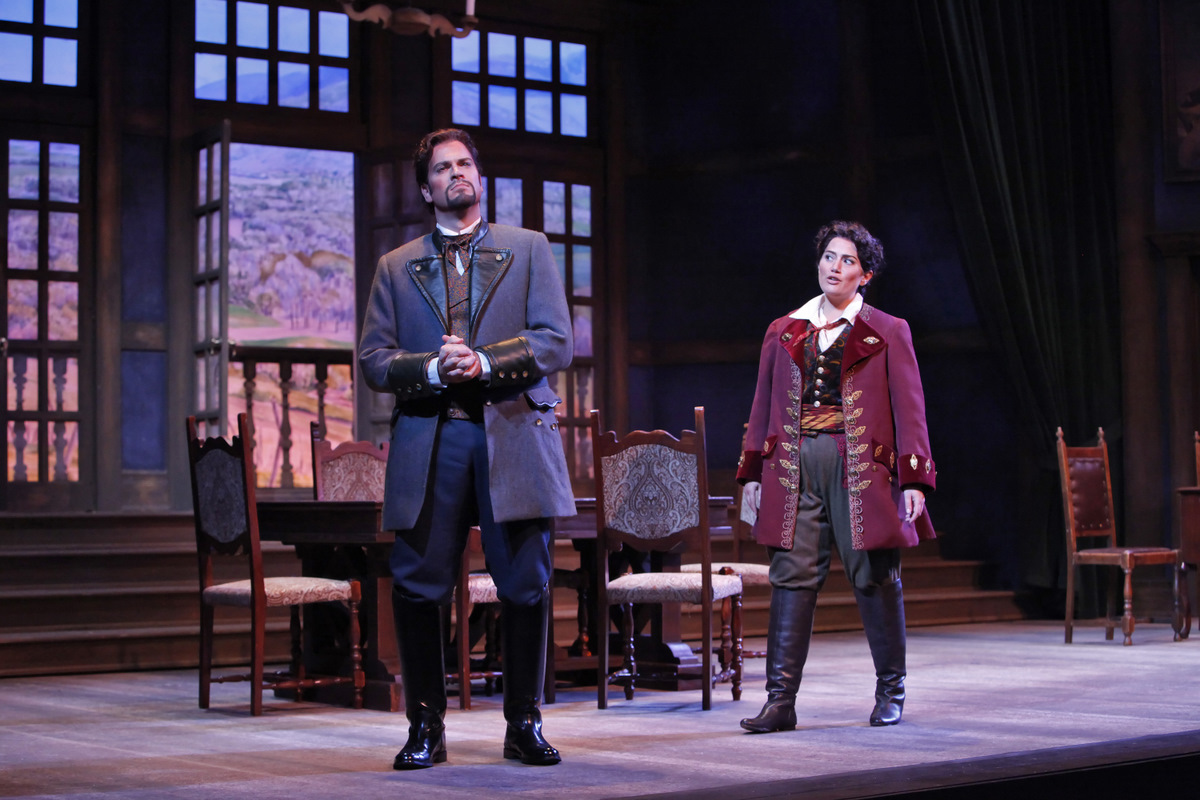A Mascagni love story with no knives or ear-biting
SARASOTA—Pietro Mascagni possessed the rare talent and good fortune to create an operatic masterpiece at age 26 with his very first attempt—Cavalleria Rusticana. He then spent the rest of his long life attempting to duplicate that triumph, writing fourteen more operas, alas, without similar success.
Still, immediately after the Sicilian blood-and-guts of Cavalleria, Mascagni enjoyed some sophomore acclaim with his next opera, L’Amico Fritz, a romantic fable as sweet and unclouded, as its predecessor was dark and violent. Kudos to Sarasota Opera for letting us experience this neglected work, presented Wednesday night.
L’Amico Fritz enjoyed popularity during Mascagni’s lifetime but has been shot out of the canon since, though its name has been kept alive by the mellifluous Act 2 Cherry Duet. The slender scenario concerns the love of the wealthy good-hearted landowner Fritz for the tenant peasant girl, Suzel, and the complications produced by the match-making attempts of the rabbi David, Fritz’s friend.
Thin stuff, but the music is quite glorious, chock full of charming melody with two soaring love duets, and a gorgeous Intermezzo. Never one to rest on his laurels or repeat himself, Mascagni’s music is smartly orchestrated with plenty of harmonic quirks and offbeat elements—the trousers female role for the gypsy boy Beppe, klezmer-like clarinet writing, and an extended offstage violin solo—to hold one’s interest over a brief ninety minutes.
Marking its 50th anniversary season, Sarasota Opera gave this likable work a worthy mounting with Michael Schweikardt’s attractive scenic design, superb advocacy by conductor David Neely and a wonderful supporting performance by baritone Michael Corvino as the wily David. Yet in an opera where Italianate vocalism and some personal charm are requisites, the performance was let down by its two leading singers.
Benjamin Warschawski brought a fine stage presence and forthright attitude to Fritz. Yet, as in previous appearances, his voice is problematic, forceful but dry-toned and prone to turn gravelly when the tenor forces his voice, which is often. Warschawski brought little Italianate legato to the duets and was jarringly raw of tone in Fritz’s Act 3 paean to love, O amore, o bella luce del core.
At least the Swiss tenor provided some personality, which is more than one can say of Catherine Cangiano as Suzel. The New York soprano makes a pretty heroine, but showed little of the peasant girl’s naïve, girlish qualities. Pensive and rarely smiling, Cangiano seemed more like Suzel’s ill-tempered stepsister, making one wonder what Fritz sees in her in the first place. Vocally, she was over-parted as well with a shallow, edgy soprano a size too small for the role.
Sarasota perennial Corvino provided the most consistency as David, making up for a hoary baritone with a finely detailed, engaging portrait of the old schemer. Rounding out the cast were Heather Johnson, a delightful Beppe, Bernard Holcomb and Michael Scarcelle as Fritz’s friends, and Abla Lynn Hamza as Caterina, his housekeeper. Conductor Neely made a richly eloquent case for this tuneful score, drawing responsive, sumptuous playing from the excellent Sarasota Opera Orchestra, with sweet-toned violin solos from concertmaster Liang-Ping How.
In a future season, Sarasota might try another Mascagni rarity, perhaps Iris, the Japanese tragedy that served as inspiration for Puccini’s considerably better-known opera.
Mascagni’s L’Amico Fritz has two more performances, March 14 and 21. $25-$115. 941-366-8450. www.sarasotaopera.org.
[Photos by Richard Termine: Top, Benjamin Warschawski (Fritz) and Catherine Cangiano (Suzel); above, Warshawski and Heather Johnson (Beppe]
Posted in Performances
One Response to “A Mascagni love story with no knives or ear-biting”
Leave a Comment
Thu Mar 12, 2009
at 3:39 pm
1 Comment


Posted Mar 17, 2009 at 9:33 pm by Alberto Mederos
A 100% love story and there was no “love”.
I do not know if Cangiano could have done better…..I noticed in particular the chin sticking to her chest and “a piece” with her torso. Those shoulders did not move at all even when she was up the ladder.
I dare say that it was a very poor staging.